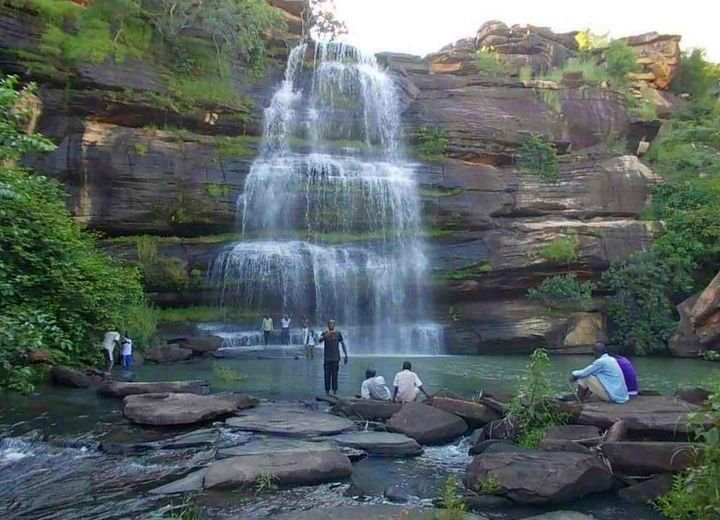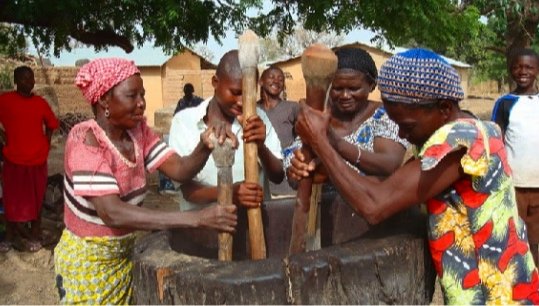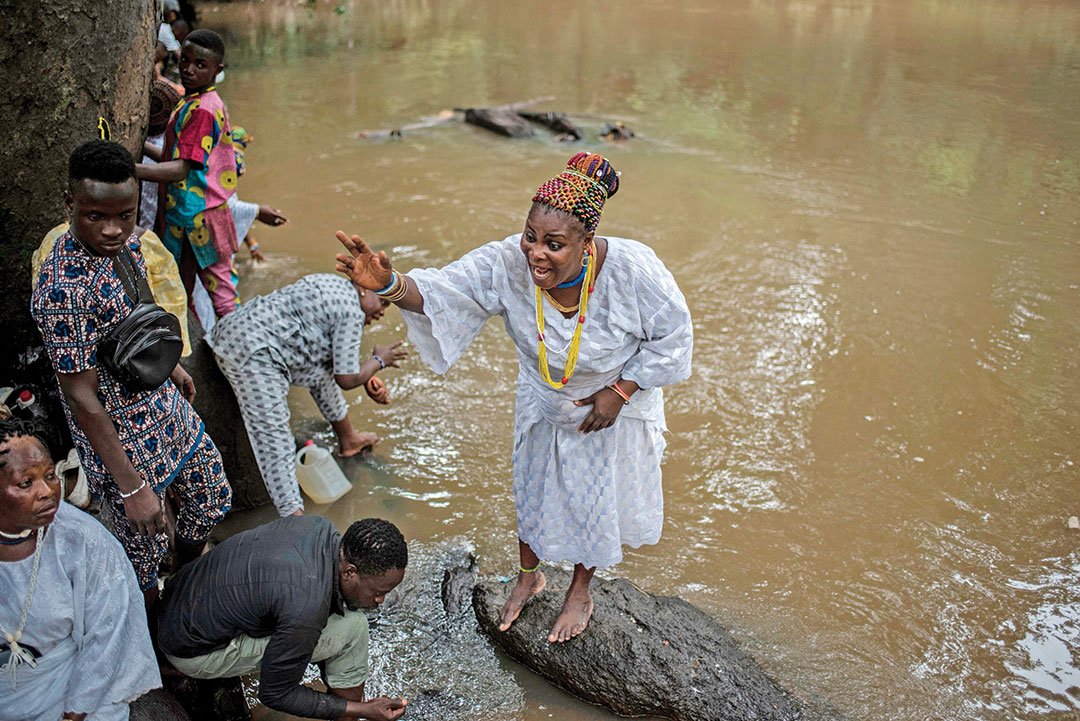
– Composed by Duane Steffens, and Edited Glenn Nangaku Leisching
Water holds profound symbolism and sacred significance in various cultural practices around the world. Among the Dagara tribe, an indigenous community in West Africa, water plays a crucial role in their shamanic rituals and ceremonies. This article explores the shamanic use of water within the Dagara tribe, delving into the cultural context, symbolism, and practical applications of water in their spiritual practices.
Introduction
The Dagara tribe, residing primarily in Burkina Faso, Ghana, Côte d’Ivoire, and Togo, possess a rich spiritual heritage deeply intertwined with their natural surroundings. Their shamanic practices, guided by wisdom passed down through generations, involve a profound connection with the elements of nature. Water, in particular, holds immense significance, serving as a conduit for spiritual communication, healing, and transformation.
The Dagara Tribe
Before delving into the shamanic practices of the Dagara tribe, it is important to gain a brief understanding of their cultural context. The Dagara are a deeply communal society, valuing collective well-being and harmony with nature.
They believe in the interconnectedness of all beings and recognize the spiritual essence present in every aspect of existence.
Shamanism in the Dagara Culture
Shamanism forms the spiritual backbone of the Dagara tribe. Shamans, revered as mediators between the spiritual and physical realms, play a vital role in guiding the community through rituals, healing practices, and divination. They possess deep knowledge of the sacred traditions, acting as spiritual leaders and advisors within the tribe.

Significance of Water in Shamanic Practices
Water as a Sacred Element
In the Dagara worldview, water holds a sacred status as a life-giving and purifying element. It is considered a conduit between the physical and spiritual realms, facilitating communication with ancestral spirits and other divine entities. Water symbolizes the flow of life, emotions, and ancestral wisdom.
Cleansing and Purification
Water is used extensively for cleansing and purification rituals within the Dagara tribe. Shamans and community members engage in ablution ceremonies, where water is poured over the body to cleanse away negative energies and impurities. This act of purification serves as a spiritual reset, restoring balance and harmony.
Communication with Ancestors
Water acts as a medium for connecting with ancestors in Dagara shamanic practices. During rituals, shamans may pour water onto the ground as an offering to invite the presence and guidance of ancestral spirits. It is believed that the water carries messages from the spiritual realm and opens a channel of communication with the ancestors.

Healing and Transformation
Water holds the power to facilitate healing and transformation within the Dagara spiritual paradigm. Shamans may immerse individuals in water during specific healing ceremonies, believing it can cleanse and rejuvenate the spirit. Water’s fluidity serves as a metaphor for personal growth, adaptation, and the potential for positive change.
Rituals and Ceremonies
Water is an integral component of various rituals and ceremonies performed by the Dagara tribe. These ceremonies are designed to honor the spirits, seek guidance, and foster community well-being.

Water Offerings and Pouring
In ritual contexts, water offerings hold a significant place. Shamans pour water onto the earth as an act of devotion and respect to the spirits. It is believed that these offerings nourish and appease the spiritual forces, fostering harmony within the community and the natural world.
Water Divination
Water divination, known as “nhyira”, is a practice where shamans read messages from the ancestors through the patterns formed in a container of water. By pouring water into a receptacle and observing its movements, the shaman interprets the messages conveyed by the spirits. This divination practice serves as a tool for guidance and decision-making within the tribe.
The Role of the Shaman
Shamans hold a pivotal role within the Dagara tribe, acting as spiritual intermediaries and healers. They undergo extensive training and initiations, equipping them with the knowledge and skills necessary to navigate the spiritual realms.
Shamanic Journey
Through shamanic journeying, shamans enter altered states of consciousness to connect with the spiritual realms. Water, often in the form of a river or a body of water, serves as a portal for these journeys. The shaman immerses themselves in water or listens to the sound of flowing water, enabling them to transcend the physical realm and explore the depths of the spiritual dimensions.
Divination and Guidance
Shamans employ various divination methods, including water divination, to seek guidance and provide insights to the community. By interpreting the messages conveyed through water or other divination tools, the shaman offers counsel, facilitates healing, and assists individuals in navigating life’s challenges. BEZA offers private divination sessions.
Conclusion
The shamanic use of water within the Dagara tribe encapsulates the deep reverence for the elements and the interconnectedness of all existence. Water serves as a sacred medium for communication, purification, and transformation in their spiritual practices. Through rituals, ceremonies, and divination, the Dagara people harness the power of water to connect with ancestral wisdom, promote healing, and maintain harmony within their community.
FAQ
1. What is a shamanic water ritual in the Dagara tradition?
A shamanic water ritual in the Dagara tradition is a sacred ceremony that uses water as a medium for spiritual cleansing, emotional healing, and ancestral communication. Water symbolizes the flow of life and emotions, playing a central role in connecting participants to nature and the spirit world.
2. How do the Dagara people use water for healing?
The Dagara people use water in rituals to cleanse the body and spirit, release emotional blockages, and invite healing. Water is believed to have the power to restore balance and wash away negative energy, helping participants feel more grounded and emotionally connected.
3. What are the benefits of participating in a shamanic water ritual?
Participating in a shamanic water ritual can lead to emotional healing, spiritual cleansing, and a deeper connection with nature. It helps individuals release negative emotions, feel more centered, and enhance their connection to the ancestral spirit realm.
4. How does water connect with the ancestors in Dagara spirituality?
In Dagara spirituality, water is seen as a bridge between the physical world and the ancestral realm. Offering water during rituals allows individuals to communicate with their ancestors, inviting guidance, blessings, and protection.
5. Can anyone participate in a shamanic water ritual, or do you need special training?
Anyone can participate in a shamanic water ritual. You don’t need special training, but it’s important to approach the ritual with respect and openness. At Born as the Earth Zen Academy (BEZA), we offer workshops and retreats that introduce participants to the powerful healing practices of the Dagara tradition.
More Reading
https://thesonderproject.org/clean-water-dagara-tribe-malidoma-some/
https://medium.com/@kismetic_miles/dagara-tribe-perspective-837b7fcb1c67
https://www.goodreads.com/book/show/192354.Of_Water_and_the_Spirit
https://fireupwaterdown.com/2016/12/27/the-five-elements-of-the-dagara-west-africa/
Daily Meditation Sessions
*Meditation Training is required to join the online Zen Meditation sessions:
Mornings
Monday – Friday: 07:00AM – 08:00AM
Evenings
Tuesday & Thursday 20:00PM – 21:00PM
Sessions happen online via Zoom
Zazen Meditation Training
Monthly
19:00PM – 21:00PM
Meditation training sessions happen online via Zoom
Unlike generic Meditation Apps, our instructors and teachings offer you personalized guidance on a step-by-step evolutionary path to self-discovery and inner harmony. Whether you are a beginner or an experienced practitioner, engage this easily accessible opportunity and awaken to your True Nature and find joy and solace in the serene landscapes of your physical, mental, emotional and spiritual body.
BEZA Meditation training is by donation.

Compassionate WATER Module
Way of Balance

Learn harmonising techniques – how to sense and relate to others. Access your emotional intelligence. Navigate the complexities of human and non-human relationships. Acquire the skills of meditation; compassion; resonance; resolving dilemma; and shadow work.
